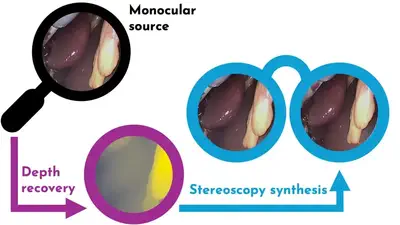PhD opportunity [October 2025 start] on "Computational stereovision synthesis from monocular neuroendoscopy"
Applications are invited for the fully funded 1+3 years MRes+PhD or 4 years PhD MRC DTP studentship (including home tuition fees, annual stipend and consumables) starting in October 2025.
Award details:
- Focus: Computer vision for surgical imaging applications
- Primary supervisor: Tom Vercauteren
- Secondary Supervisor: Jonathan Shapey
- Third Supervisor: Dr Pavol Surda
- Funding type: 4-year fully-funded MRC DTP studentship including a stipend, tuition fees, research training and support grant (RTSG), and a travel and conference allowance.
- Application closing date: Tuesday 29 October 2024
- Start date: October 2025

Project Overview
This project focuses on machine learning approaches to synthetise 3D stereoscopic display from a monocular video feed captured through a standard neuroendoscope. The 3D vision capability will be tested in realistic surgical exercises to evaluate the benefit of computationally inferred depth cues.
Endoscopic surgery has become the gold standard for the treatment of several skull base and ear, nose and throat (ENT) pathologies. However, restricted access and viewing conditions make endoscopic endonasal procedures challenging and complex to learn. Most endonasal procedures are performed using monocular endoscopes which further reduces depth perception ability. Stereo-neuroendoscopy has recently entered the market. It has been shown to improve surgical training, but its adoption has been hampered by additional cost and relative reduction of image quality.
To overcome this barrier, this project proposes to exploit standard high-quality monocular endoscopy video feeds to generate stereoscopic vision. Recent developments in machine learning have demonstrated the ability of large models to generate accurate depth maps from monocular surgical images. Yet, these approaches remain at an early stage, have not been extended to real-time surgical video inference, and have not been utilised to solve any clinically relevant task. The PhD student will address these limitations by taking advantage of the multidisciplinary translational research environment nurtured by the co-supervisors.
In Year 1, the student will familiarise themselves with multi-view geometry and generative models and will design learning-based approaches exploiting physics-based constraints.
In Year 2, network distillation and lightweight generative models will be developed to enable real-time inference capabilities. Throughout the project, the student will interact closely with surgeons and member of the broader clinical team.
This leads to Years 3-4 focusing on conceiving and implementing robust useability studies to evaluate the impact of the research on clinically relevant surrogate tasks, iterating on previous developments, and writing up the thesis.
Representative Publications from Supervisors
- Budd, C., & Vercauteren, T. (2024). Transferring Relative Monocular Depth to Surgical Vision with Temporal Consistency. Proc MICCAI 2024. https://arxiv.org/abs/2403.06683
- Ahmad, M. A., Weiler, Y., Joyeux, L., Eixarch, E., Vercauteren, T., Ourselin, S., … & Vander Poorten, E. (2023). 3D vs. 2D simulated fetoscopy for spina bifida repair: a quantitative motion analysis. Scientific Reports, 13(1), 20951. https://doi.org/10.1038/s41598-023-47531-9
- Vercauteren, T., Unberath, M., Padoy, N., & Navab, N. (2019). CAI4CAI: The rise of contextual artificial intelligence in computer-assisted interventions. Proceedings of the IEEE, 108(1), 198-214. https://doi.org/10.1109%2FJPROC.2019.2946993
- Khan, D. Z., … Shapey, J., … & Babu, P. (2023). CSF rhinorrhoea after endonasal intervention to the skull base (CRANIAL): A multicentre prospective observational study. Frontiers in Oncology, 12, 1049627. https://doi.org/10.1016/j.wneu.2020.12.171
- Pak, H. L., Lambru, G., Okasha, M., Maratos, E., Thomas, N., Shapey, J., & Barazi, S. (2022). Fully endoscopic microvascular decompression for trigeminal neuralgia: technical note describing a single-center experience. World Neurosurgery, 166, 159-167. https://doi.org/10.1016/j.wneu.2022.07.014
- Kitchen, N., & Shapey, J. (2019). The operating theatre environment. Oxford textbook of neurological surgery. Oxford University Press, Oxford, 45-56. https://doi.org/10.1093/med/9780198746706.003.0004